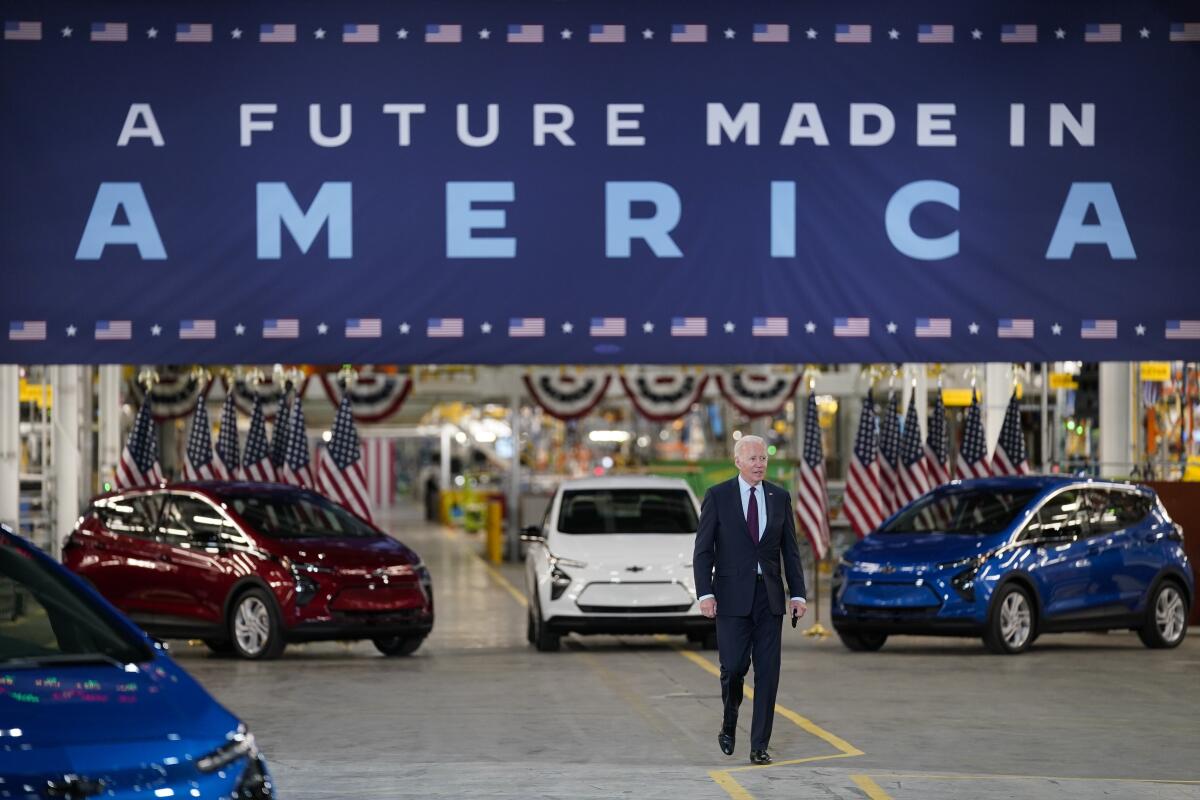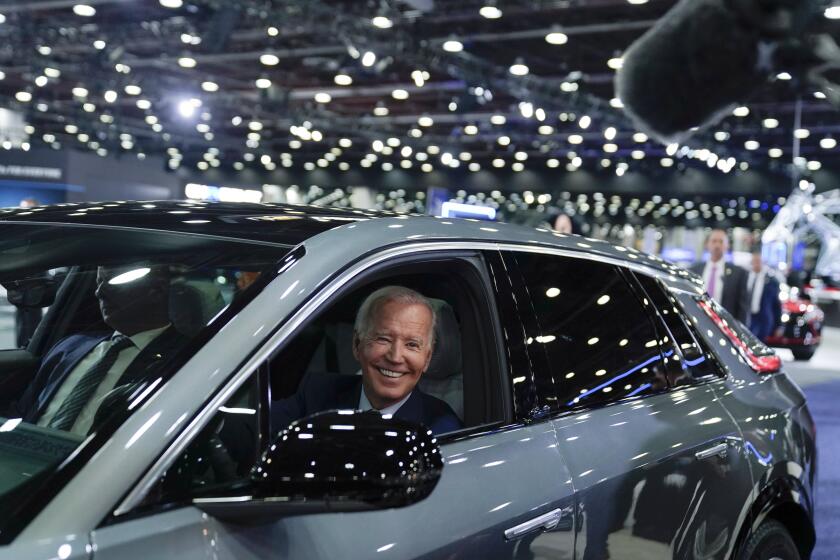Editorial: Don’t believe the naysayers. We can electrify the economy without leaving workers behind

The U.S. economy is in the early stages of an once-in-a-lifetime shift from an economy powered by fossil fuels. To prevent catastrophic climate change we have to switch quickly to electric vehicles and appliances fueled by renewable energy.
But it shouldn’t come at the expense of good-paying jobs — and it doesn’t have to.
Now that the electrification revolution is solidly underway — with electric car sales surging and electric heat pumps outselling gas furnaces — bad-faith actors are trying to exploit workers’ anxieties about their role in a zero-emission future. That effort has been on display most recently in the autoworkers’ strike against the Big Three carmakers.
The Inflation Reduction Act is the biggest investment in climate action in U.S. history, but it pales in comparison to the scale of action needed to keep global warming from reaching disastrous levels.
When former President Trump visited Michigan last month, he said electric vehicle mandates will kill the U.S. auto industry so it doesn’t matter what sort of contract autoworkers secure. “In two years you’re all going to be out of business,” he said, adding that “your jobs will be gone forever.”
It took only a few days for the United Auto Workers to expose that lie with its Oct. 6 announcement that General Motors committed to put its battery manufacturing operations under the union’s national agreement.
World leaders are still doing far too little to stop the burning of fossil fuels. If they won’t heed climate scientists, can we at least get them to listen to the pope?
“We’ve been told the EV future must be a race to the bottom, and now we’ve called their bluff,” UAW President Shawn Fain said.
Workers have legitimate reasons to worry that as automakers shift to EVs they will shut down internal combustion engine and transmission plants and replace them with low-wage battery factory jobs. But the agreement with GM shows that is a choice, and that tackling climate change by shifting to a zero-emission economy does not have to mean leaving workers behind.
While thousands prepare to march in New York City with a clear demand to protect the environment for future generations, some of those in power are talking about ending only “unabated” emissions.
The federal subsidies in the Inflation Reduction Act, the landmark climate law President Biden signed last year, are understandably fueling uncertainty about autoworkers’ place in an electric future. The law’s incentives have spurred a flood of new clean-energy projects, including plans for private investment of more than $80 billion in electric vehicle plants and battery factories, most of them in the emerging “battery belt,” an area stretching from Michigan to Georgia.
It’s a historic opportunity to bring back U.S. manufacturing jobs while tackling the existential threat of climate change. But as the auto industry restructures, it must do so in a way that’s fair to workers and produces vehicles that are affordable to consumers.
If California wants people to drive less to cut planet-warming emissions, the state should be spending far more money on pedestrian, bike and transit projects.
So far, red states with lower wages and less union representation have the most new clean-energy projects. That makes it all the more important that automakers offer livable wages and labor protections and do right by the workers who are building the future. That won’t be accomplished by emulating Tesla. It may produce some of the nation’s top-selling electric vehicles, but its nonunionized factories pay lower wages and have a history of complaints about difficult and unsafe working conditions.
Some workers may fear that vehicle electrification will leave them behind. But there is no evidence that it will cause a broad swath of blue-collar jobs to disappear or become “lower paid, less skilled or less desirable,” said Sanya Carley, a professor at the University of Pennsylvania who has studied autoworkers in the Midwest and Appalachian coal mining communities. “It’s a false dichotomy to say that we need to pursue decarbonization or equity. We can do both at the same time.”
Contrast that with Trump’s opportunistic defeatism, which only plays into the hands of oil and gas companies that stand to profit from any delay in phasing out their polluting products.
Fortunately, Biden understands that the energy transition does not have to come at the expense of good-paying, middle-class jobs. Many of the Inflation Reduction Act’s tax incentives for clean energy projects are tied to higher labor standards. Biden has joined autoworkers on the picket line and wants more union-led training and apprenticeship programs to make sure that workers displaced by the shift are first in line for electric vehicle and battery manufacturing jobs.
“We’re going to leave nobody behind,” Biden said last month in Detroit.
Biden and other leaders have a lot of work ahead to deliver on that promise, but it’s right to demand that good-paying jobs are a nonnegotiable part of our zero-emission future.
More to Read
A cure for the common opinion
Get thought-provoking perspectives with our weekly newsletter.
You may occasionally receive promotional content from the Los Angeles Times.














